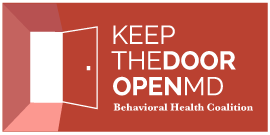Download full press release here.
(Annapolis, Md.) – Today, the Maryland Behavioral Health Coalition announced its support of legislation to raise Maryland’s minimum wage to $15 per hour but will push for an amendment to provide a commensurate boost in funding for community behavioral health resources. Advocates say the state must provide an increase in funding for community mental health and substance use treatment providers in order to offset the cost of implementing a minimum wage increase.
“We are fully supportive of raising the minimum wage for all Marylanders, including for our community behavioral health workers who deliver life-saving mental health and substance use disorder treatment for those in need,” said Lori Doyle, public policy director for the Community Behavioral Health Association of Maryland (CBH). “However, reimbursement for these providers is set by the state and is not adjusted to account for rising costs. In addition, most public behavioral health services are subject to regulated staffing ratios, so there is no ability to reduce staff. Any increase in the minimum wage must include a commensurate increase in behavioral health reimbursement rates so providers are not forced to reduce or eliminate services.”
“If a bill to raise the minimum wage is important enough to pass, it is important enough to fund,” added Doyle.
Over the past several years, the Behavioral Health Coalition worked on its “Keep the Door Open” campaign to ensure an increase in funding for community behavioral health providers, which only had six modest increases in over 20 years. This multiyear budget commitment was included in the bipartisan HOPE Act that passed the Senate unanimously and the House nearly unanimously in 2017. Were the minimum wage bill to pass without a corresponding boost to providers, this progress would be undone and providers would be forced to cut programs.
“The Governor and the General Assembly have shown great leadership over the past several years to provide critically needed funding for behavioral health,” said Dan Martin, senior director of public policy for the Mental Health Association of Maryland. “It is crucial that we do not undermine that great work. Marylanders deserve a raise, but if community behavioral health providers are not supported in this legislation, it will further limit their ability to treat our friends and family members living with mental health and substance use disorders.”
Failure to amend the bill without accounting for increased costs to community behavioral health providers could also hinder ongoing state efforts to battle the heroin and opioid epidemic.
“We are making real progress, but we are still in the midst of an opioid epidemic that is ravaging Maryland families,” said Howard Ashkin, president of the Maryland Association for the Treatment of Opioid Dependence. “We simply cannot risk hamstringing our community substance use treatment providers who are working day in and day out to address the crisis.”
Stagnating reimbursement has long strained the community behavioral health system. Nearly half of the providers in CBH’s membership operate at a deficit. At the same time, demand for mental health and substance use treatment has steadily increased over the past several years. Over 260,000 Marylanders now rely on the state’s public behavioral health system.
In addition to ensuring adequate resources in the state budget for community behavioral health, the Coalition’s 2019 legislative platform includes a number of other priorities: expanding behavioral health services in schools to improve student health and educational outcomes; improving access to medication-assisted treatment (MAT) and other substance use treatment options; and diverting behavioral health patients from costly emergency rooms and general hospitals to community-based services.
The Coalition has planned a “Keep the Door Open” March on Annapolis for February 20 beginning at the Maryland Fire-Rescue Memorial in Annapolis. Similar rallies in previous years have drawn hundreds of attendees.
Advocates are tweeting about the campaign using #KeeptheDoorOpenMd.
###
Media Contacts:
Lori Doyle, Community Behavioral Health Association of Maryland, 410-456-1127
Dan Martin, Mental Health Association of Maryland, 410-978-8865
Howard Ashkin, Maryland Association for the Treatment of Opioid Dependence, (410) 608-1517
